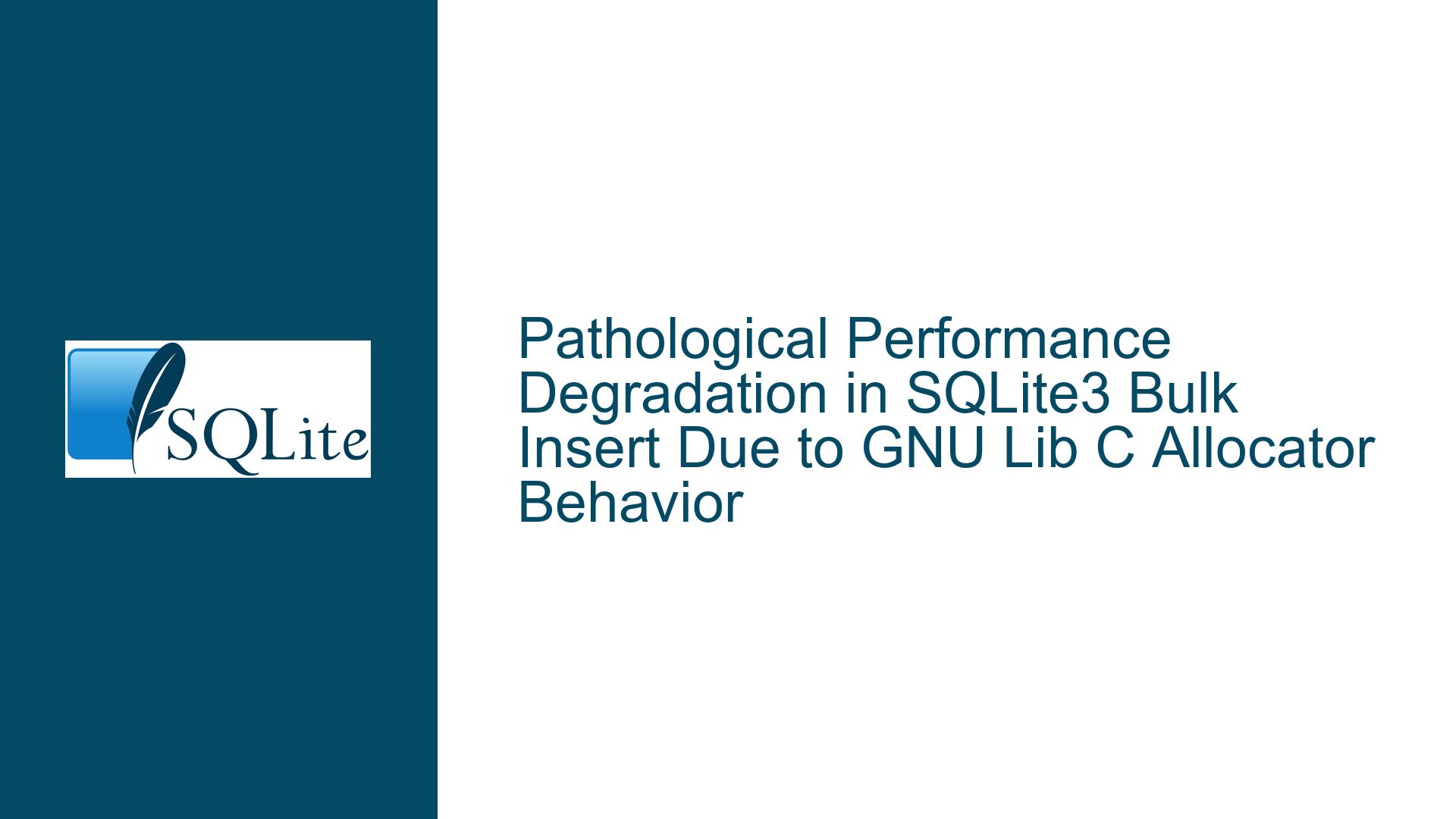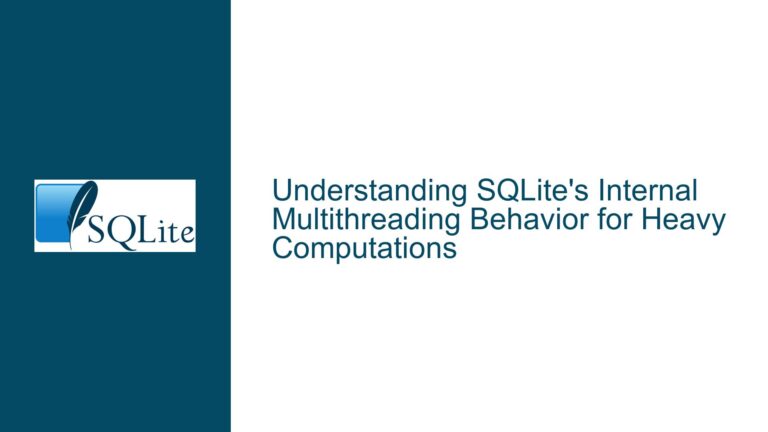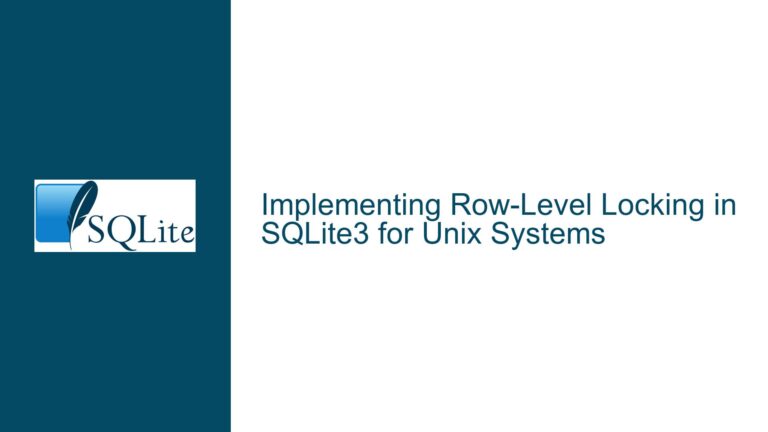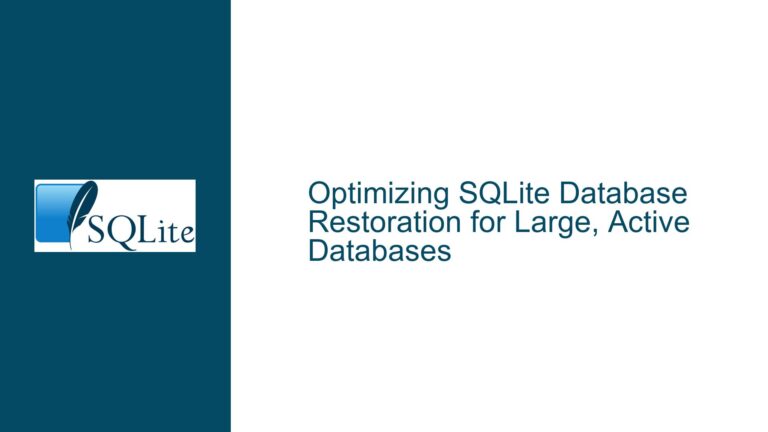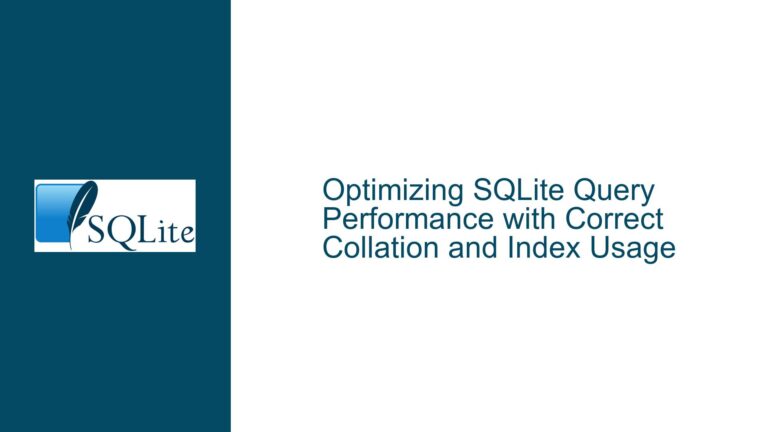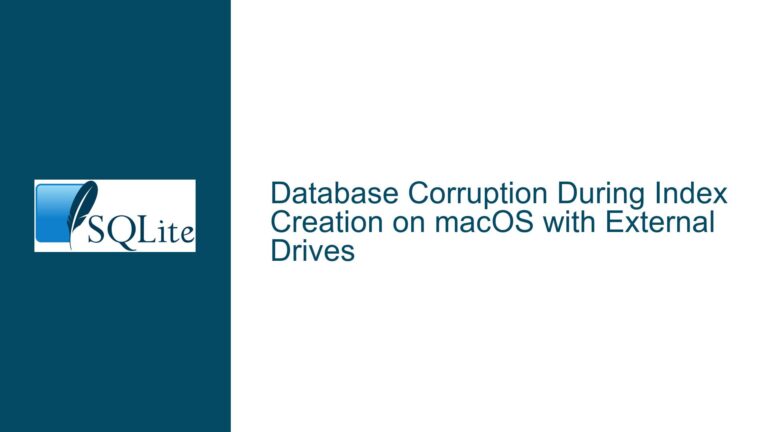Pathological Performance Degradation in SQLite3 Bulk Insert Due to GNU Lib C Allocator Behavior
Issue Overview: Excessive System Calls and Memory Allocation Patterns in SQLite3 Bulk Insert
The core issue revolves around a significant performance degradation observed during bulk insert operations in SQLite3, specifically when inserting data into a table with a schema that includes constraints such as CHECK and PRIMARY KEY. The degradation manifests as an excessive number of system calls, particularly brk, which are traced back to SQLite3’s getPageNormal procedure. This behavior is exacerbated on systems running Linux with GNU Lib C 2.39, where the memory allocator appears to be overwhelmed by the allocation and deallocation patterns of SQLite3 during the bulk insert operation.
The schema in question involves two tables: parents and children. The parents table has a single column, parent_id, which is the primary key. The children table includes parent_id, sequence, and two additional columns with CHECK constraints. The bulk insert operation involves inserting 50,000 records into the parents table followed by a similar operation on the children table. The performance issue is particularly pronounced when the children table is involved, suggesting that the constraints and the structure of this table play a significant role in the observed behavior.
The performance degradation is characterized by a four-fold increase in system time, with over 60% of the program’s runtime consumed by system calls. This is evidenced by profiling tools such as strace, callgrind, and perf, which highlight the getPageNormal procedure as the primary source of the issue. The problem is reproducible on Linux 6.7.2 with GNU Lib C 2.39 and SQLite3 3.45.1, but not on other systems such as macOS, indicating a potential issue with the GNU Lib C allocator.
Possible Causes: Memory Allocation Patterns and GNU Lib C Allocator Behavior
The root cause of the performance degradation appears to be related to the memory allocation patterns of SQLite3 during the bulk insert operation, particularly when interacting with the GNU Lib C allocator. SQLite3’s getPageNormal procedure, which is responsible for fetching database pages, triggers a large number of small memory allocations and deallocations. These allocations, typically around 10 KiB in size, are immediately deallocated, leading to a flood of brk system calls.
The GNU Lib C allocator, specifically version 2.39, seems to struggle with this pattern of short-lived, small allocations. The allocator’s dynamic adjustment mechanism, which is designed to optimize memory usage based on the program’s allocation patterns, may be exacerbating the issue. When the allocator’s trim threshold is set too low, it triggers frequent system calls to release memory back to the operating system, resulting in significant overhead.
The issue is further compounded by the schema design of the children table, which includes CHECK constraints and a composite primary key. These constraints require additional processing and memory management during the insert operation, leading to more frequent calls to the allocator. The problem is not observed when using an in-memory database or when the schema is simplified, suggesting that the interaction between SQLite3’s page cache management and the GNU Lib C allocator is a key factor.
Additionally, the issue is influenced by the specific version of GNU Lib C and the Linux kernel. The behavior is not observed on macOS, indicating that the problem is specific to the GNU Lib C implementation on Linux. The allocator’s behavior can be tuned using environment variables such as glibc.malloc.trim_threshold and glibc.malloc.top_pad, which control how the allocator manages memory and when it releases memory back to the system.
Troubleshooting Steps, Solutions & Fixes: Tuning the GNU Lib C Allocator and SQLite3 Configuration
To address the performance degradation, several steps can be taken to tune the GNU Lib C allocator and optimize SQLite3’s configuration. These steps aim to reduce the frequency of system calls and improve the overall efficiency of memory management during bulk insert operations.
1. Adjusting the GNU Lib C Allocator’s Trim Threshold:
The glibc.malloc.trim_threshold tunable controls the minimum size of the top-most, releasable chunk of memory that triggers a system call to return memory to the system. By increasing this threshold, the number of brk system calls can be reduced, thereby improving performance. In the observed case, setting the threshold to 512 KiB significantly improved performance, reducing the runtime by a factor of 3.77.
To set the trim threshold, use the following environment variable:
GLIBC_TUNABLES=glibc.malloc.trim_threshold=524288 python load_data_slow.py
or
GLIBC_TUNABLES=glibc.malloc.trim_threshold=524288 ./load_data
2. Tuning the GNU Lib C Allocator’s Top Padding:
The glibc.malloc.top_pad tunable controls the amount of extra memory that the allocator keeps at the top of the heap to reduce the frequency of system calls. Increasing this value can also help mitigate the performance degradation. In the observed case, setting top_pad to 192 KiB or higher resulted in a smooth performance improvement.
To set the top padding, use the following environment variable:
GLIBC_TUNABLES=glibc.malloc.top_pad=196608 python load_data_slow.py
or
GLIBC_TUNABLES=glibc.malloc.top_pad=196608 ./load_data
3. Configuring SQLite3’s Page Cache:
SQLite3’s page cache can be configured to reduce the number of small allocations and deallocations. By setting a static page cache size, the performance degradation can be alleviated. However, this option is only accessible from C and is not exposed in Python bindings. For C implementations, setting a static page cache size of up to 12 pages has been shown to fix the issue.
To configure the page cache in C, use the following SQLite3 API:
sqlite3_config(SQLITE_CONFIG_PAGECACHE, buffer, page_size, max_pages);
where buffer is a pre-allocated memory buffer, page_size is the size of each page, and max_pages is the maximum number of pages in the cache.
4. Using Alternative Memory Allocators:
If tuning the GNU Lib C allocator does not resolve the issue, consider using an alternative memory allocator such as jemalloc or tcmalloc. These allocators may handle SQLite3’s allocation patterns more efficiently, reducing the frequency of system calls and improving performance.
To use an alternative allocator, link the program with the desired allocator library:
clang --std=c17 -Wall -Wextra -Werror -O2 -ggdb -fno-omit-frame-pointer load_data.c -lsqlite3 -ljemalloc -o load_data
5. Profiling and Debugging with mtrace:
To gain deeper insights into the memory allocation patterns, use the mtrace tool to profile the program’s memory usage. This tool can help identify specific allocation patterns that contribute to the performance degradation. The output from mtrace can be analyzed to pinpoint the source of the issue and guide further optimization efforts.
To use mtrace, compile the program with debugging symbols and run it with mtrace enabled:
clang --std=c17 -Wall -Wextra -Werror -O2 -ggdb -fno-omit-frame-pointer load_data.c -lsqlite3 -o load_data
export MALLOC_TRACE=mtrace.out
./load_data
mtrace load_data mtrace.out
6. Reporting the Issue to GNU Lib C and SQLite3 Maintainers:
If the issue persists after applying the above fixes, consider reporting it to the maintainers of GNU Lib C and SQLite3. Provide detailed profiling data, including strace, callgrind, and perf outputs, along with a minimal reproducible example. This will help the maintainers identify and address any underlying issues in the allocator or SQLite3’s memory management.
In conclusion, the performance degradation observed during SQLite3 bulk insert operations is primarily due to the interaction between SQLite3’s memory allocation patterns and the GNU Lib C allocator. By tuning the allocator’s parameters, configuring SQLite3’s page cache, and using alternative allocators, the issue can be mitigated. Further profiling and debugging can provide additional insights and guide further optimization efforts.
